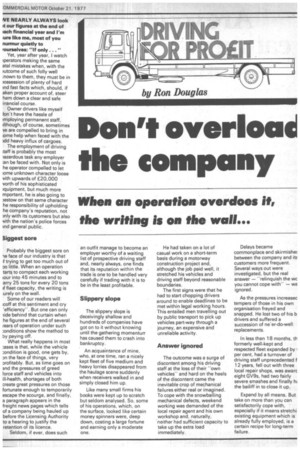Don't overlosel 0 company
Page 57

If you've noticed an error in this article please click here to report it so we can fix it.
When an operation overdoes it, the writing is on the wall...
by Ron Douglas
NE NEARLY ALWAYS look it our figures at the end of oach financial year and I'm ;ure like me, most of you nurmur quietly to 'ourselves: "If only.
Yet, year after year, I watch )perators making the same atal mistakes when, with the iutcome of such folly well :nown to them, they must be in )ossession of plenty of hard ind fast facts which, should, if aken proper account of, steer hem down a clear and safe inancial course.
Owner drivers like myself ion't have the hassle of rnploying permanent staff, ilthough, of course, sometimes ve are compelled to bring in ;ome help when faced with the )dd heavy influx of cargoes.
The employment of driving itaff is probably the most lazardous task any employer an be faced with. Not only is he operator compelled to let iome unknown character loose vith upwards of E20,000 vorth of his sophisticated )quipment, but much more mportant, he is also going to )estow on that same character he responsibility of upholding he company's reputation, not wily with its customers but also neith the nation's police forces Ind general public.
3iggest sore Probably the biggest sore on le face of our industry is that f trying to get too much out of Do little. When an operation tarts to compact each working our into 45 minutes and to :arry 25 tons for every 20 tons if fleet capacity, the writing is ,urely on the wall.
Some of our readers will ;coif at this sentiment and cry 'efficiency". But one can only lide behind that curtain when he figures at the end of several tears of operation under such onditions show the method to by paying off.
What really happens in most ..)ases is that, while the vehicle 3ondition is good, one gets by, 3n the face of things, very 3rofitably. But, as time goes on and the pressures of greed force staff and vehicles into ill-health, shortages of both create great pressures on those fortunate enough to temporarily escape the scourge, and finally, a paragraph appears in the freight news pages which tells of a company being hauled up before the Licensing Authority to a hearing to justify the retention of its licence.
Seldom, if ever, does such an outfit manage to become an employer worthy of a waiting list of prospective driving staff and, nearly always, one finds that its reputation within the trade is one to be handled very carefully if trading with it is to be in the least profitable.
Slippery slope
The slippery slope is deceivingly shallow and hundreds of companies have got on to it without knowing until the gathering momenturr has caused them to crash into bankruptcy.
An acquaintance of mine, who, at one time, ran a nicely kept fleet of five medium and heavy lorries disappeared from the haulage scene suddenly when receivers walked in and simply closed him up.
Like many small firms his books were kept up to scratch but seldom analysed. So, some of his operations, which, on the surface, looked like certain money spinners were, deep down, costing a large fortune and earning only a moderate one. He had taken on a lot of casual work on a short-term basis during a motorway construction project and, although the job paid well, it stretched his vehicles and driving staff beyond reasonable boundaries.
The first signs were that he had to start chopping drivers around to enable deadlines to be met within legal working hours. This entailed men travelling out by public transport to pick up vehicles part-way through a journey, an expensive and unreliable activity.
Answer ignored
The outcome was a surge of discontent among his driving staff at the loss of their "own vehicles" and hard on the heels of the discontent came the inevitable crop of mechanical failures either real or imagined. To cope with the snowballing mechanical defects, weekend working was demanded of the local repair agent and his own workshop and, naturally, neither had sufficient capacity to take up the extra load immediately. Delays became commonplace and skirmishe; between the company and it customers more frequent. Several ways out were investigated, but the real answer — "relinquish the wc you cannot cope with" — wa ignored.
As the pressures increasec tempers of those in his own organisation frayed and snapped. He lost two of his b drivers and suffered a succession of ne'er-do-well replacements.
In less than 18 months, th formerly well-kept and respected fleet expanded by per cent, had a turnover of driving staff unprecedented f 12 years, fell out with three local repair shops, was awarc eight GV9s, had two fairly severe smashes and finally hi the bailiff in to close it up.
Expand by all means. But take on more than you can satisfactorily cope with, especially if it means stretchi existing equipment which is already fully employed, is a certain recipe for long-term failure.






































































































